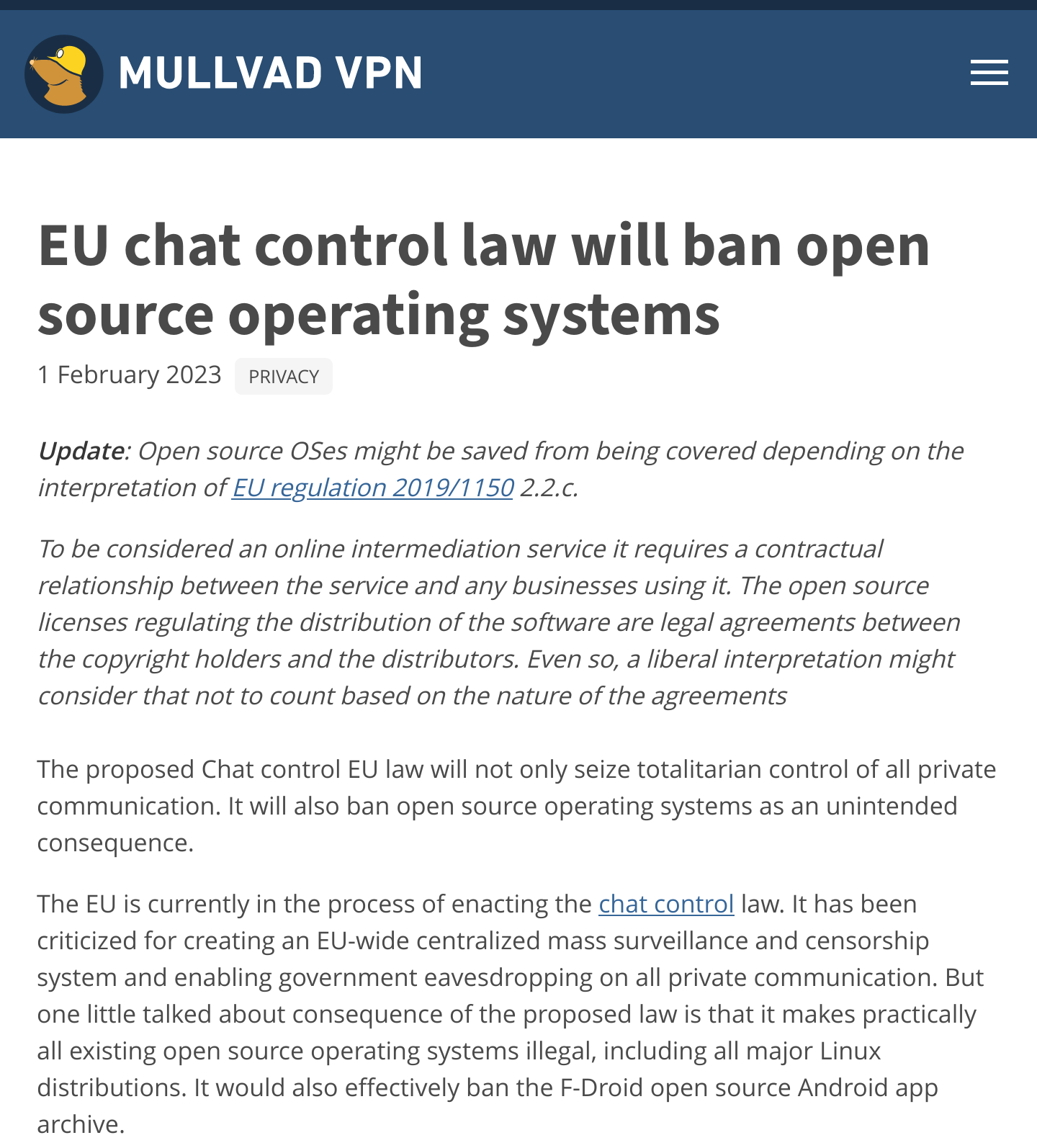Not a big fan of the title (asking question in the title isn’t a great idea) but the conclusions give a good summary:
The Cyber Resilience Act (CRA) represents a significant step in Europe’s efforts to enhance cybersecurity. However, its potential implications for the open source software community have raised serious concerns. Critics argue that the legislation, in its current form, could impose undue burdens on open source contributors and inadvertently increase the risk of software vulnerabilities being exploited.
New insights from GitHub’s blog post highlight additional concerns. The CRA could potentially introduce a burdensome compliance regime and penalties for open source projects that accept donations, thereby undermining the sustainability of these projects. It could also regulate open source projects unless they have “a fully decentralised development model,” potentially discouraging companies from allowing their employees to contribute to open source projects. Furthermore, the CRA could disrupt coordinated vulnerability disclosure by requiring any software developer to report to ENISA all actively exploited vulnerabilities within a timeline measured in hours after discovering them.
I didn’t read the article but one thing I can say is that open source cannot be killed, by design!
Yes, but companies can be deterred from using/developing it.
If it’s not a critical code, I agree. However, e.g. Linux, companies cannot deter from it.
This should be named the “Attempting to Kill Open Source Software by Imposing Impossible Burdens on the Same Act.” I’m not sure that they intended this to destroy open source projects but… it may have that effect regardless.
This article seems poorly written and says the same thing over and over again with slightly different wording. I would have liked some more specifics.
The Cyber Resilience Act (CRA) could have several implications for the open source software sector:
- Increased legal and financial responsibility
- Deterrent effect on the development of open source software
- Lack of consideration for the specificities of open source software
- Lack of consultation of the open source software community
Only 2 of those are implications of the law. 3 and 4 are redundant and are not caused by the law’s wording. They wouldn’t even be a problem if not for 1. 2 is also caused by 1 in a fairly obvious way.
I agree, but will say that English is not the author’s native language. I thought it was a relevant share because the author has been part of the FOSS movement since the late 90s.
Why is everyone up in arms about this?
The legislation specifically excludes open source software. Has nobody in this discussion actually read the proposed legislation?
From the current proposal legislation text:
In order not to hamper innovation or research, free and open-source software developed or supplied outside the course of a commercial activity should not be covered by this Regulation. This is in particular the case for software, including its source code and modified versions, that is openly shared and freely accessible, usable, modifiable and redistributable.
There is also a clause that states those using open source software in commercial products must report any vulnerabilities found to the maintainer.
free and open-source software developed or supplied outside the course of a commercial activity
99% of open source software development is part of a commercial activity.
As I understand it - and I’m not sure I do - the act essentially makes contributors to open source software legally responsible for security. And the penalty for failing to comply is 15 million Euros.
Combine a fine I can’t afford, with legislation I’m not qualified to understand (I am not a lawyer), and basically I’m just going to have to stop writing open source software. I can’t afford to pay a lawyer to check if I’m in compliance, so I have to assume I could be fined. Which just isn’t worth the risk.
Hows does the limitation of liability section in basically every open source license factor into this? It seems like you’d be fine as long as you aren’t personally using the code commercially? Or would this new law somehow override the open source license?
The latter. The law always takes precedence over contract terms.
No it doesn’t. It makes IBM responsible for what it ships in Red Hat, it doesn’t apply to someone that made some library in their weekend that somehow ended up on all Linux distributions.
Wow this thing is a huge mess of text @.@ That’s in there, though. (10) under the “whereas” at the top of the proposal bit. Not mentioned in the “scope” part, where I’d expected. Maybe others expected it there too, and not mixed in with seventy other things up top? I’m just guessing here; presumably someone familiar with these sorts of documents would know to look there or would just bust out the Ctrl+F magicks and find this :-\
Open source software is also notably lacking from the impact assessment documents, but I suspect this is because it was intended to not impact open source software at all. It seems the legislation intends to exclude open-source software, but doesn’t clearly and unambiguously exclude open source software that is developed or contributed to in a commercial setting (e.g by paid contributors).
I think the wording seems clear enough to determine the intent, but the ambiguity surrounding the “commercial activity” part might necessitate trial (which nobody wants to risk), or might lead to poor implementation of this directive in the laws of member states. I think we should be campaigning to improve the wording, not reject it outright.
The “developed or supplied outside the course of a commercial activity” condition is part of why people are up in arms about this. If I’m at work and I run into a bug and submit a patch, that code was developed in the course of a commercial activity.
It also acts as a huge disincentive for companies to open their code at all. If I package up a useful library I wrote at work, and I release it, and some other person downloads it and exposes a vulnerability that is only exploitable if you use the library in a way that I wasn’t originally using it, boom, my company is penalized.
Ah, OK. So it seems it’s a case of the spirit of the text not matching the precise technical wording used. IMO, the legislation clearly intends to exclude freely-distributable open-source software, but the issue lies with what constitutes a commercial activity. (I’ve not yet checked the rest of the document to see if it clearly defines “commercial activity” in relation to the legislation.)
TBH, it seems that what is needed here is a clarification and tightening up of definitions, not wholesale rejection of the legislation.
In words of Dan Geer from his 2014 Black Hat keynote:
Today the relevant legal concept is “product liability” and the
fundamental formula is “If you make money selling something, then
you better do it well, or you will be held responsible for the
trouble it causes.” For better or poorer, the only two products
not covered by product liability today are religion and software,
and software should not escape for much longer.The EU legislation has good intentions. Software should not escape product liability. However, the current proposal is somewhat flawed (unless EU actually intends to finance security testing for FOSS projects!) and it needs some language to protect open-source innovation and distributed development models.
I’m hoping the EU will allow a model where FOSS developers can receive donations/charge for support without having to risk huge penalties.
Mullvad VPN has a great blog about this:

I do not understand how this should be interconnected. Why would the chat control law make Linux illegal? And isn’t this a completely different topic? OPs post was about “Cyber Resilience Act” and like zero_iq already explained Open Source software is explicitly excluded from this.
But beside this I thing the chat control law is a very bad idea that really need more focus in mainstream media.
Wow so there’s more acts in EU to kill the privacy. How nice.
There are always all kind of directions and forces in all of politics not only in EU.
That’s why we need to always watch the voted representants all the time. Sadly many people only see democracy as something you started to deal with two weeks before a main election…







